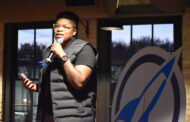A little under a year ago, I joined the Startland News team.
Since then, I bet I’ve witnessed at least 150 entrepreneurs pitch their company.
It’s safe to say I’ve learned a lot about innovation and entrepreneurship. I’m lucky I get to spend my days asking people who have “done it” how they “did it.” It leaves me feeling inspired and gives me faith in the world.
And although yes, Startland is a startup too, a lot of the entrepreneurial knowledge I’ve gained has been theoretical. I’ve never actually started a business. I’ve never created a pitch deck for a company. I don’t know how it feels to stand before a crowd and share a business idea.
But, over the weekend, that changed.
On Friday, I participated in Startup Weekend KC — a 48-hour event for techies, designers and entrepreneurial spirits to come together and build a startup over the course of a weekend.
Not only did the process give me a newfound respect for my sources and community, but I learned a lot too. Here are my main takeaways.
Candid communication is key
During Startup Weekend I joined the team Sustained Colectiva, an online marketplace that centralizes sustainable fashion options in one shopping cart— such as Patagonia and PrAna — for customers.
Before we began the process, founder and team leader Jean Joo told our team of six ladies that “no matter what happens, let’s promise to stay friends.”
While it was difficult at times, we decided to get honest about our strengths and weaknesses, backgrounds and expectations for the project.
This candid, honest communication set the tone for the weekend. Throughout the process, we also used a sticky-note communication tool, “Tame the Chaos,” that Techstars teaches.
Know your market
Before you can begin to build, you have to know your customer. Something that we kept getting stuck on as a team initially was the desire for “everyone” to use our product as opposed to identifying who our early adopters were.
After trial and error with market research, I hit the streets of Kansas City and talked to prospective customers in person. Even if you think you know your customer, it’s remarkable the amount of focus it can bring to your vision once you start talking to real people. Don’t assume — do your research.
Don’t be afraid to lean on mentors
Although mentors may be a reminder of how much you’ve yet to learn, they’re there to help.
Let down your pride and admitting what you don’t know is the best way to learn. And the great thing about Kansas City’s startup community is how accessible people are and how willing they are to help.
A developer and team member Ruby Rios, 17, perfectly expressed this.
“It’s not about what you know, it’s about what you’re willing to learn,” she said.
You have something to offer
No matter what your skills are, you can contribute. Whether you’re a natural leader or the type of person who will quietly crank out pages of code in minutes, you have something to offer. Whether you’re business minded, an artist or a developer — your perspective is valuable.
For me, part of the fun of Startup Weekend KC was figuring out what that “thing” I had to offer is. You won’t know until you try.
The power of a shared goal
When you’re closely and intensely working alongside people, don’t underestimate the power a clearly shared goal to propel you forward.
Networking is great, but Startup Weekend took personal connections to the next level. Thanks to rapid problem solving and goal setting, social barriers naturally broke down.
A shared goal forces you to rely on one another and acknowledge that you’re a part of a larger whole. There’s power in that recognition — you feel trust, you feel support and, eventually, it compounds to help achieve you and your team’s mission.
I’m grateful to have witnessed this not only with my team, but with all Startup Weekend participants.
When you’re consumed with stress, a common goal will spark you into achieving better than you would by yourself.
Trust the process
When you build a startup over a weekend, the pressure cuts deep. It’s important to remember that whatever you’re building — a business, a side hustle or a personal project — it takes patience.
If the goal is growth, then you should expect that where you are right now is not where you want to be. When you trust the learning process, you accept the fact that life will throw you obstacles. It’s only when you are OK with this and enjoy the process that you can truly succeed.









































